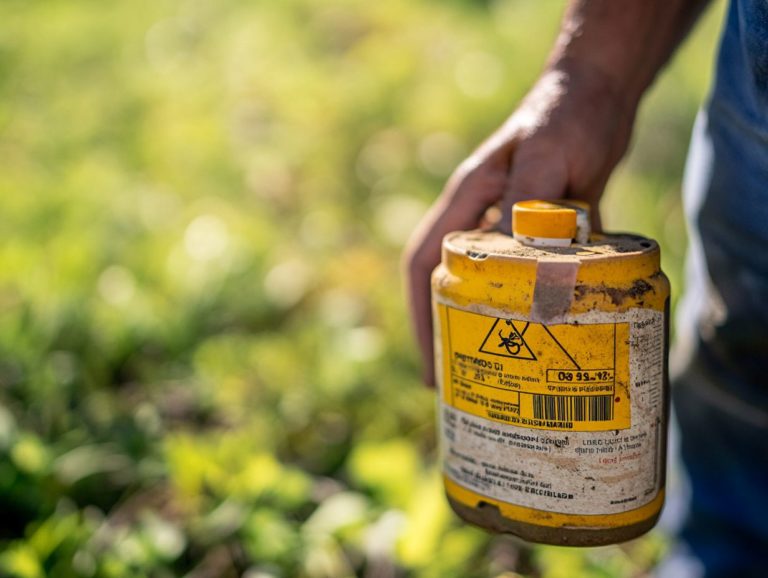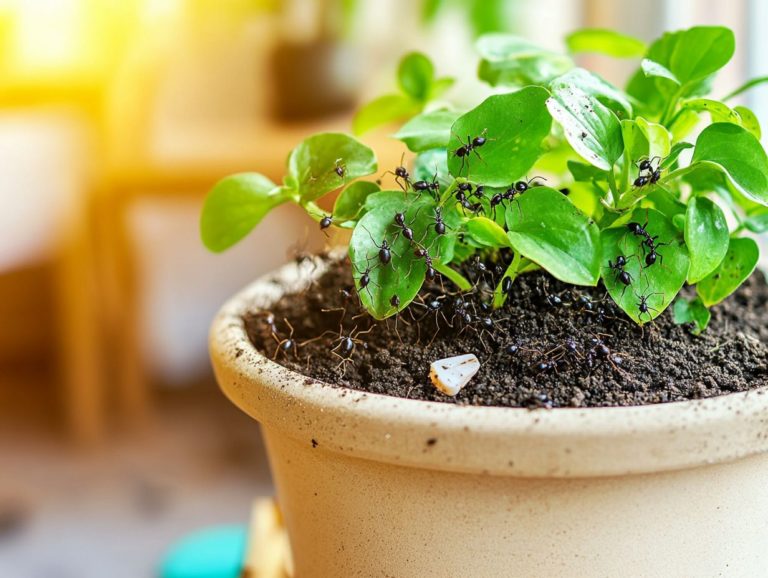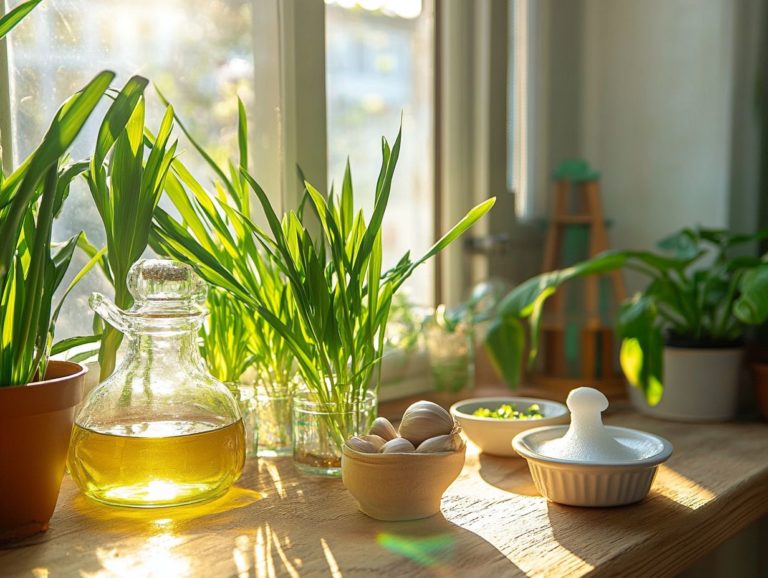The Impact of Soil Quality on Pest Infestations
Soil quality is often the unsung hero in your garden, playing a pivotal role in the health and resilience of your plants. When your soil is rich in nutrients and bustling with beneficial microbes, your plants will thrive and become less vulnerable to pests. Neglecting soil health can invite infestations that threaten your garden’s vitality.
Discover how soil quality can transform your garden and keep pests at bay! This article delves into the intricate relationship between soil quality and pest management, providing you with valuable insights on enhancing soil health while controlling insect pests naturally. You’ll gain an understanding of common pests and discover effective soil management practices, empowering you to cultivate a thriving garden ecosystem that minimizes pest issues.
Immerse yourself in practical tips and organic methods to ensure your plants remain healthy and free from pests!
Contents
- Key Takeaways:
- The Importance of Soil Quality
- How Pests Challenge Your Plants’ Health
- How Soil Quality Can Attract or Repel Pests
- Improving Soil Quality to Prevent Pest Infestations
- Organic Pest Control Methods
- Frequently Asked Questions
- What is the relationship between soil quality and pest infestations?
- How does poor soil make pests more likely?
- What are some signs of poor soil quality that can contribute to pest infestations?
- Can improving soil quality help reduce pest infestations?
- Are there any natural methods for controlling pest infestations through soil quality and promoting healthy soils?
- How can farmers and gardeners test the quality of their soil and implement sustainable agriculture practices to prevent pest infestations?
Key Takeaways:
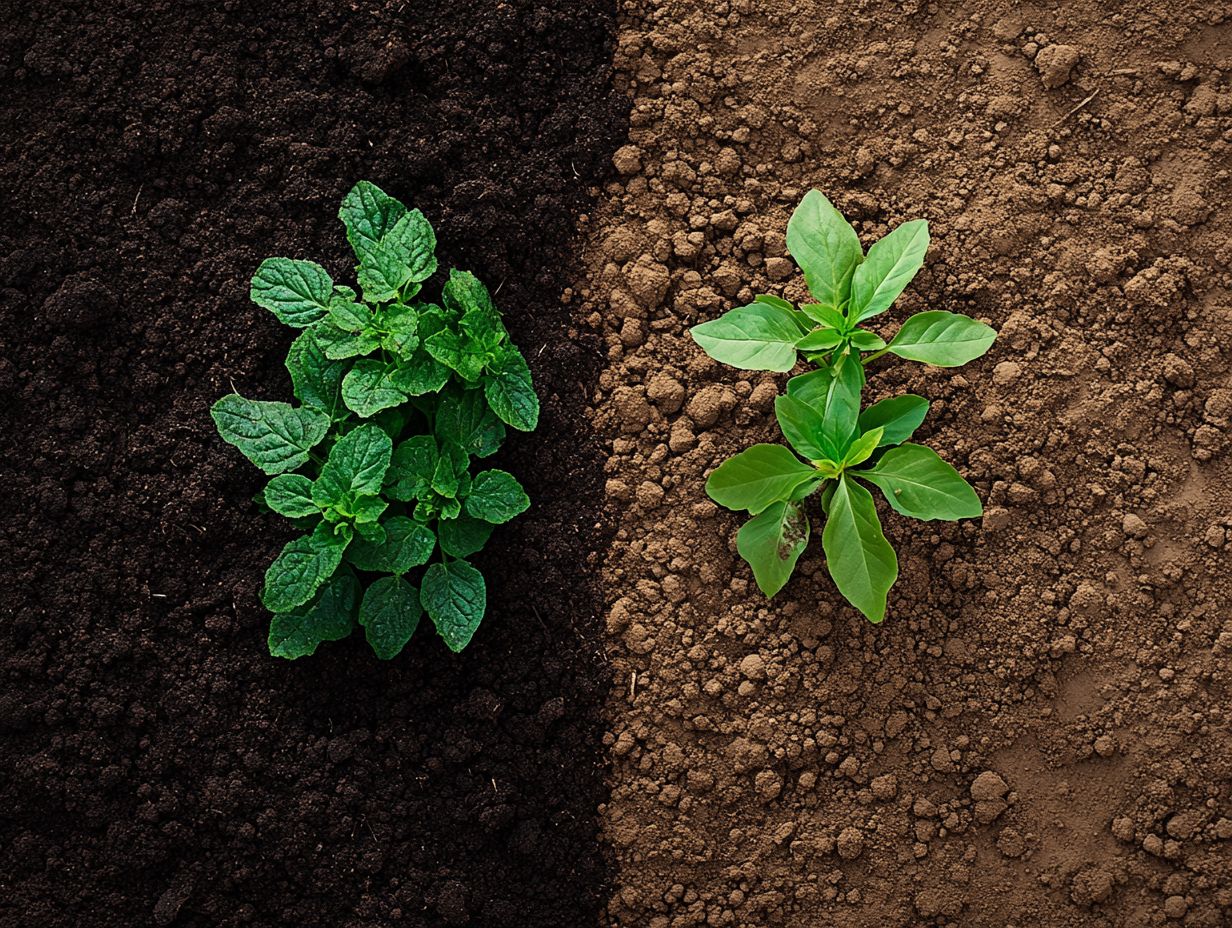
- Soil quality plays a crucial role in plant health and can affect the severity of pest infestations.
- Understanding the relationship between soil quality and pest attraction can help prevent and manage infestations.
- Implementing proper soil management techniques and using organic pest control methods can improve soil quality and reduce the risk of pest infestations, including the dangers posed by harmful chemicals like pesticides.
The Importance of Soil Quality
Soil quality stands as a cornerstone of agricultural sustainability, acting as the bedrock for healthy soils that directly impact crop production, soil health, and the resilience of entire ecosystems.
When soils are healthy, they brim with organic matter and nurture a vibrant community of soil organisms including beneficial fungi, bacteria, and various invertebrates. These organisms play critical roles in nutrient availability and microbial decomposition.
By adopting effective soil management practices, you can enhance soil properties, ensuring a thriving agricultural system that balances economic viability with environmental integrity.
How Soil Quality Affects Plant Health
Soil quality has a profound influence on plant health, shaping everything from nutrient availability to soil structure and the overall resilience of your crops against environmental stresses. A thriving soil ecosystem plays a crucial role in nutrient cycling, ensuring that essential minerals and nutrients remain accessible to your plants.
The presence of organic matter like decomposed plant material and microorganisms not only enriches the soil but also boosts its water retention capabilities. This structural integrity of the soil is vital for root development, allowing your plants to secure their footing while tapping into the vital resources they need, thus promoting overall soil resilience.
This intricate relationship underscores the significance of maintaining soil health, which ultimately supports the vitality and productivity of your crops, enabling them to flourish across diverse environmental conditions.
How Pests Challenge Your Plants’ Health
Common pests, including various insect populations, can profoundly affect plant health and agricultural yields. This often leads to a reliance on harmful chemicals such as pesticides, insecticides, and even chemical poisons, which can disturb the delicate balance of beneficial organisms within soil ecosystems.
Start improving your soil quality today and watch your garden thrive!
Identifying and Understanding Pest Infestations
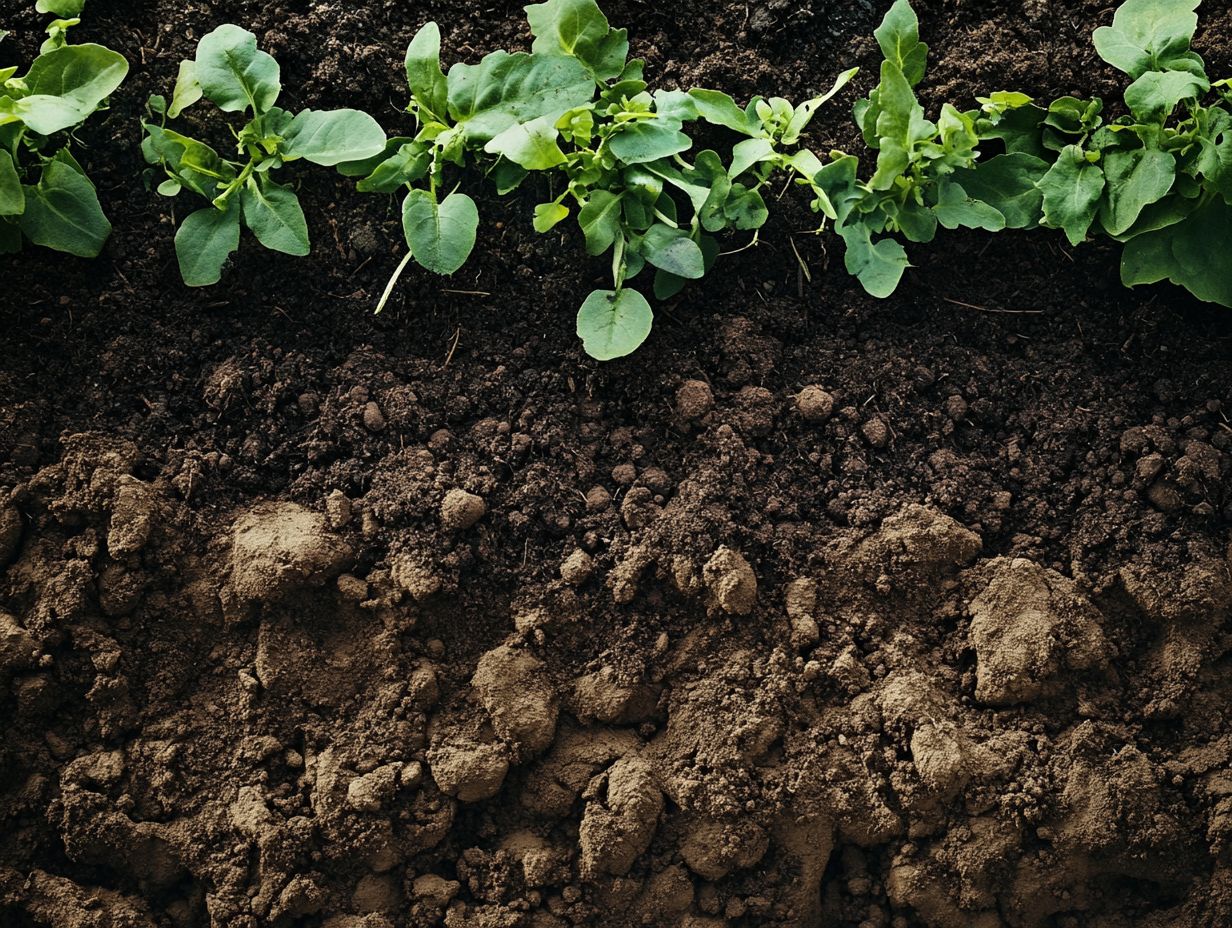
Identifying pest infestations is vital for your success in safeguarding crop health. Understanding how to implement effective pest control methods ensures the health of your crop fields while promoting sustainable agricultural practices. Leverage the latest research from organizations such as the USDA Natural Resource Conservation Service.
Your thorough approach begins with visual inspections. During these inspections, you or a pest control specialist carefully examine plants for signs of damage, discoloration, or pest activity.
Soil testing is equally vital. It helps assess the presence of pest eggs or larvae lurking beneath the surface.
By grasping the ecology of pests, you enhance early detection. This allows you to develop a plan to manage pests responsibly, prioritizing environmental health and promoting a rich diversity of life in your garden.
Recognizing the life cycles and behaviors of pests helps you choose effective control methods. This minimizes harm to beneficial insects and the ecosystem.
How Soil Quality Can Attract or Repel Pests
Soil quality plays a critical role in attracting or repelling pests. When diverse soil organisms thrive and nutrient levels are optimal, they foster an environment that nurtures healthy crops while deterring harmful insects. This showcases the role of beneficial fungi in the process.
The Role of Nutrient Levels and Soil Microbes
Nutrient levels and soil microbes are vital to soil health. They influence your plants’ growth and ability to withstand pests.
The dynamic interplay between these components enhances soil biodiversity and supports vigorous plant development. When microbial activity thrives, particularly in breaking down organic matter and releasing crucial nutrients, it fosters healthier plants and a more vibrant ecosystem.
A diverse community of soil microbes plays a significant role in carbon sequestration. This captures atmospheric carbon in the soil, a process critical for mitigating climate change and maintaining soil organism health.
By nurturing a flourishing microbial community, you improve the overall health of your soil. This enhances nutrient availability and creates a balanced environment that promotes sustainable agricultural practices.
Improving Soil Quality to Prevent Pest Infestations
Act now to enhance soil quality with effective management practices! Strengthen your defenses against pest infestations. By cultivating healthy soils, you nurture robust plant systems that stand strong against pests, creating a thriving ecosystem in your garden or farm.
Effective Soil Management Techniques
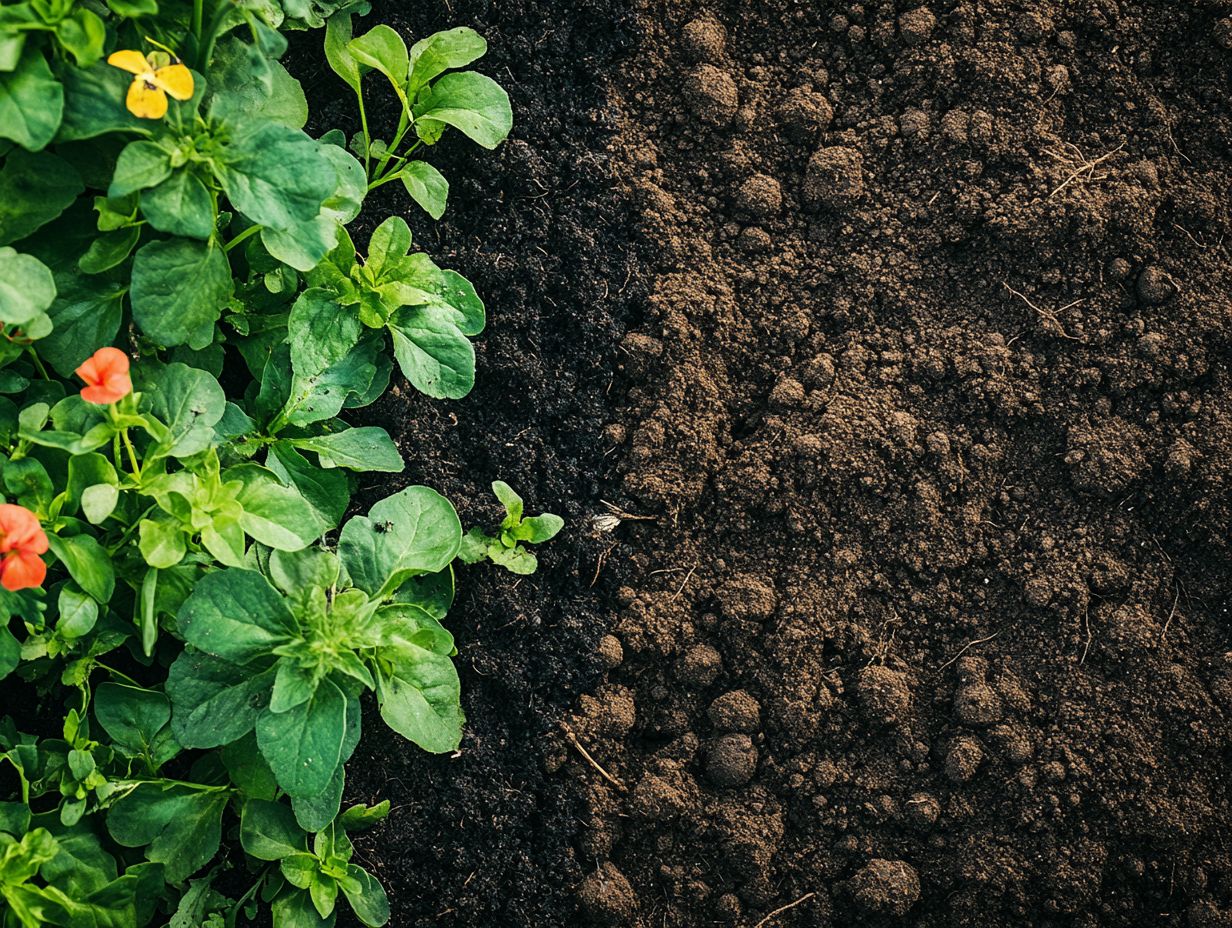
Implementing effective soil management techniques, such as utilizing soil amendments and minimizing soil disturbance, can greatly enhance nutrient availability. These practices foster sustainable agriculture.
By embracing methods like cover cropping, crop rotation, and reduced tillage, you can significantly improve soil structure and boost organic matter content. This results in healthier ecosystems.
These techniques not only nurture the soil’s natural fertility but also assist in pest management by providing homes for helpful insects. Understanding the role of soil quality in plant health is crucial. Sustainable practices cultivate resilient agricultural systems that withstand environmental challenges while maintaining high productivity and reducing ecological footprints.
Ultimately, adopting a holistic approach to soil health enables you to grow crops that thrive in harmony with their surroundings. This ensures biological diversity and healthy soils.
Organic Pest Control Methods
Organic pest control methods allow you to harness the power of natural systems and beneficial arthropods to manage pest populations effectively. By adopting these practices, you promote ecological approaches that enhance agricultural sustainability, creating a harmonious balance in your environment.
Natural Ways to Combat Pests
Natural methods to tackle pests involve harnessing beneficial organisms, companion crops (plants that help each other grow), and cover crops (plants grown to improve soil health). These elements work together to boost biological diversity and create effective pest control.
Start using these strategies today to see amazing results! You can significantly reduce reliance on chemical inputs like harmful pesticides while nurturing a resilient ecosystem that supports plant health.
Think about beneficial organisms like ladybugs and lacewings; they can effectively decrease pest populations. Meanwhile, companion crops can attract these natural allies and deter harmful species. For example, planting marigolds next to your vegetables can help repel certain nematodes.
Cover crops improve soil health and provide habitats for various beneficial insects, enhancing the balance in your agricultural environment while supporting small creatures in the soil that help plants grow.
These synergistic effects pave the way for sustainable farming practices and can lead to higher yields over time.
Frequently Asked Questions
What is the relationship between soil quality and pest infestations?

The quality of soil directly impacts pest infestations. Healthy soil rich in nutrients and microbial activity can support natural predators of pests, making it harder for pests to thrive.
How does poor soil make pests more likely?
Poor soil quality leads to weak and stressed plants, making them more susceptible to pest attacks. It can also disrupt the natural balance of beneficial organisms that keep pest populations in check.
What are some signs of poor soil quality that can contribute to pest infestations?
Indicators of poor soil quality include compacted soil, lack of organic matter, and imbalanced pH levels. These conditions create an environment favorable for pest infestations.
Can improving soil quality help reduce pest infestations?
Yes, improving soil quality through methods such as adding organic matter, adjusting pH levels, and reducing compaction can create a healthier ecosystem that is less conducive to pest infestations, supporting soil organisms vital for maintaining balance.
Are there any natural methods for controlling pest infestations through soil quality and promoting healthy soils?
Yes, implementing practices such as crop rotation, intercropping, and using cover crops can enhance soil quality and promote natural predators of pests, reducing the need for harmful chemicals.
How can farmers and gardeners test the quality of their soil and implement sustainable agriculture practices to prevent pest infestations?
Various soil tests are available to measure factors such as pH levels, nutrient content, soil structure, and microbial activity. These tests can help identify issues with soil quality that may contribute to pest infestations and inform effective pest control methods.
Act now to protect your garden from pests! Start improving your soil quality and explore natural pest control methods today!

